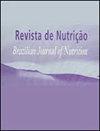Association between bone mineral content and dietary patterns among Brazilian adults from Viçosa, Minas Gerais: a population-based study
IF 0.5
4区 医学
Q4 NUTRITION & DIETETICS
Revista De Nutricao-brazilian Journal of Nutrition
Pub Date : 2022-01-01
DOI:10.1590/1678-9865202235e210154
引用次数: 0
Abstract
ABSTRACT Objective The aim of the study was to investigate if there is an association between dietary patterns and bone mineral content among Brazilian adults. Methods This is a cross-sectional, population-based study. Bone health was assessed using dual-energy x-ray absorptiometry. The dietary pattern was obtained using a food frequency questionnaire. An exploratory factor analysis obtained the dietary patterns. Linear regression was used for the multivariate analysis. The research was conducted with adult individuals (20-59 years old) of both sexes residing in the city of Viçosa, MG, Brazil (n=572). Results Two distinct dietary patterns were identified: a “meats and alcoholic drinks” pattern, composed of condiments, alcoholic drinks, dough-based foods, and savory snacks; and a “local traditional” pattern, composed of eggs, beans, trooper’s beans, margarine, butter, olive oil, coffee and tea, cereals, and tubers (factor loadings ≥0.20). Having verified the associations considering the confounding factors, we identified that the bone mineral content for males was positively associated with the “local traditional” dietary pattern (β=0.058; 95% CI: 0.003–0.112; p=0.036), and for females an inverse association with the “meats and alcoholic drinks” pattern was found (β=-0.057; 95% CI: -0.110 -0.003; p=0.037). Conclusion We identified a positive association between the local traditional dietary pattern and bone health.米纳斯吉拉斯州维萨罗萨的巴西成年人的骨矿物质含量与饮食模式之间的关系:一项基于人群的研究
【摘要】目的研究巴西成年人的饮食模式与骨矿物质含量之间是否存在关联。方法:这是一项基于人群的横断面研究。采用双能x线吸收仪评估骨健康。饮食模式是通过食物频率调查问卷获得的。探索性因子分析获得了饮食模式。多变量分析采用线性回归。研究对象为居住在巴西MG市vipersorosa的成年男性(20-59岁)(n=572)。结果确定了两种不同的饮食模式:“肉类和酒精饮料”模式,由调味品、酒精饮料、面食和咸味小吃组成;“当地传统”模式,由鸡蛋、豆类、骑兵豆、人造黄油、黄油、橄榄油、咖啡和茶、谷物和块茎组成(因子负荷≥0.20)。考虑到混杂因素,我们验证了这些关联,我们发现男性骨矿物质含量与“当地传统”饮食模式呈正相关(β=0.058;95% ci: 0.003-0.112;P =0.036),女性与“肉类和酒精饮料”模式呈负相关(β=-0.057;95% ci: -0.110 -0.003;p = 0.037)。结论发现当地传统饮食模式与骨骼健康之间存在正相关关系。
本文章由计算机程序翻译,如有差异,请以英文原文为准。
求助全文
约1分钟内获得全文
求助全文
来源期刊
CiteScore
1.20
自引率
12.50%
发文量
24
审稿时长
6-12 weeks
期刊介绍:
Revista de Nutrição is former Revista de Nutrição da Puccamp, founded in 1988. It is a bimonthly publication every four months and it is of responsibility of the Centro de Ciências da Vida, da Pontifícia Universidade Católica de Campinas . It publishes articles that contribute to the study of Nutrition in its many sub-areas and interfaces; and is open to contributions of the national and international scientific communities.

 求助内容:
求助内容: 应助结果提醒方式:
应助结果提醒方式:


